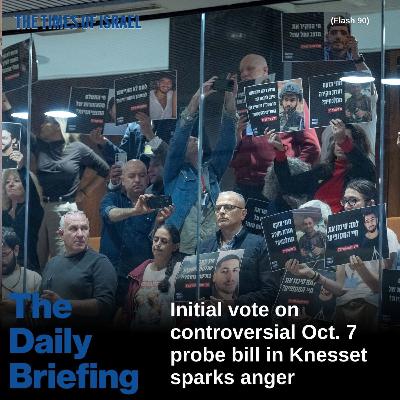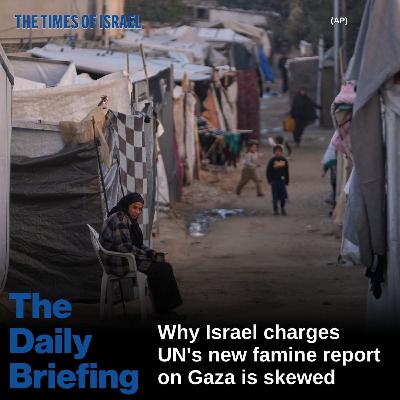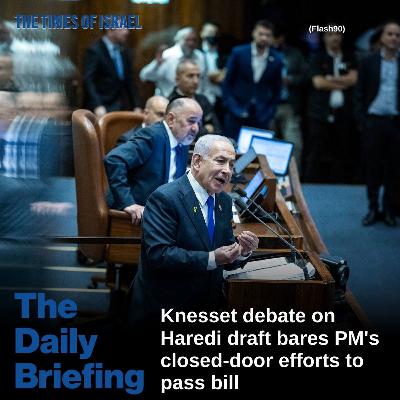Discover The Times of Israel Daily Briefing
The Times of Israel Daily Briefing

1537 Episodes
Reverse
Welcome to The Times of Israel's Daily Briefing, your 20-minute audio update on what's happening in Israel, the Middle East and the Jewish world. Political reporters Ariela Karmel and Sam Sokol join host Jessica Steinberg for today's episode. After lawmakers on Wednesday voted in favor of a preliminary reading of a highly controversial bill to establish a politically appointed probe into the October 7, 2023, failures, rather than a state commission of inquiry, Sokol discusses the bill, created by Prime Minister Benjamin Netanyahu's political allies to satisfy critics demanding an investigative commission but with membership that the governing coalition can control. Another one of Netanyahu's allies, Knesset Speaker Amir Ohana, infuriated the ultra-Orthodox parties in the coalition, reports Karmel, when he voted in favor of a civil marriage bill, further destabilizing the already shaky coalition. Karmel also discusses statements made by Diaspora Affairs Amichai Chikli, one of the first members of the prime minister's coalition to comment on the explosive allegations against Netanyahu in the Qatargate affair, in a major departure from the usual rhetoric of the Netanyahu government. Sokol wraps up the podcast with a report about a gathering of the English-speaking Haredi community in Ramat Beit Shemesh, as they attended an event run by leading rabbis about dodging the IDF draft. Check out The Times of Israel's ongoing liveblog for more updates. For further reading: Contentious law for politically appointed Oct. 7 probe passes preliminary Knesset reading Knesset Speaker Ohana votes for civil marriage bill, enraging ultra-Orthodox parties Chikli backs probe of Qatargate allegations, in first such comment from a minister Haredi rabbis push English-speakers to dodge IDF draft, worried they might join up Subscribe to The Times of Israel Daily Briefing on Apple Podcasts, Spotify, YouTube, or wherever you get your podcasts. This episode was produced by Podwaves. IMAGE: Bereaved October 7, 2023 families during a plenum session at the Knesset on December 24, 2025 (Yonatan Sindel/Flash 90)See omnystudio.com/listener for privacy information.
Welcome to The Times of Israel's Daily Briefing, your 20-minute audio update on what's happening in Israel, the Middle East and the Jewish world. Legal and settlements reporter Jeremy Sharon joins host Amanda Borschel-Dan for today's episode. Defense Minister Israel Katz told settlements leaders on Tuesday that, “With God’s help when the time comes, we will also establish… pioneer groups in northern Gaza, in place of the settlements that were evacuated.” He later walked back his statements, but not before Finance Minister Bezalel Smotrich doubled down on them and also pushed for Prime Minister Benjamin Netanyahu to convince US President Donald Trump to recognize annexation of the West Bank in his upcoming US trip. We dive into the issues of Jewish settlements in the Gaza Strip and West Bank in the first half of the program. The IPC famine monitoring organization stated on Friday that food security conditions in the entire Gaza Strip “remain critical,” in a new report covering the second half of October and all of November that classified the territory as being in its “Emergency” Phase 4 category — the fourth highest of its five levels of food insecurity. Sharon explains Israel's criticism of the report and raises the question of whether the Hamas-run Gazan Health Ministry has been manipulating its numbers of war casualties. Earlier this month, the High Court of Justice ruled unanimously 7-0 to annul the government’s decision to fire Attorney General Gali Baharav-Miara, asserting that the government had failed to provide legal justification for its decision to change the way an AG is fired, and determining that the new system it designed was fundamentally flawed. Sharon reviews the decision and updates us on the ongoing existential crisis between the government and the court. Check out The Times of Israel's ongoing liveblog for more updates. For further reading: Katz vows Israel will build settlements in northern Gaza, later walks back comments Dozens of settler activists enter Gaza, plant Israeli flags in bid to resettle enclave PA accuses Israel of ‘tightening colonial control’ over West Bank with new settlements Government announces 19 new West Bank settlements and legalized outposts IPC monitor says ‘famine conditions’ over but Gaza food security still ‘critical’; Israel rejects findings Israel says famine monitor did not seek aid facilitators’ input for upcoming Gaza report High Court annuls firing of attorney general; cabinet ministers urge defiance of ruling Subscribe to The Times of Israel Daily Briefing on Apple Podcasts, Spotify, YouTube, or wherever you get your podcasts. This episode was produced by Podwaves. IMAGE: A tent camp for displaced Palestinians in Deir al-Balah, central Gaza Strip, December 23, 2025. (AP Photo/Abdel Kareem Hana)See omnystudio.com/listener for privacy information.
Welcome to The Times of Israel's Daily Briefing, your 20-minute audio update on what's happening in Israel, the Middle East and the Jewish world. US bureau chief Jacob Magid joins host Amanda Borschel-Dan for today's episode. Saudi Arabia’s former intelligence chief, Prince Turki bin Faisal, spoke with Magid on Sunday and said that Riyadh is currently not even entertaining the idea of normalizing relations with Israel and will only do so if Jerusalem begins acting like a “normal country.” We hear how Israel could behave more "normally" and what else the royal family member said. US Ambassador to Israel Mike Huckabee held a rare meeting with Palestinian Authority Vice President Hussein al-Sheikh in Ramallah last Wednesday to discuss ongoing tensions in the West Bank. We speak about the fraught US-PA ties and how this meeting comes on the heels of increased cooperation surrounding ceasefire efforts in the Gaza Strip. And finally, US Vice President JD Vance claimed in an interview on Sunday that almost no Americans are antisemitic and that concerns about antisemitic voices are raised as a way to avoid discussing “a real backlash to a consensus view in American foreign policy” on Israel. Magid delves into this thorny issue, even as attacks against Jews in the US continue to be at a high since the Hamas attack on southern Israel on October 7, 2023. Check out The Times of Israel's ongoing liveblog for more updates. For further reading: Ex-Saudi intel chief to ToI: Riyadh will consider normalization when Israel acts normally Huckabee holds rare meeting with PA official to discuss West Bank tensions — officials Huckabee: Iran ‘didn’t get the full message’ when US bombed its nuclear sites Vance: Almost no Americans are antisemitic, real issue is ‘backlash’ to US policy on Israel Subscribe to The Times of Israel Daily Briefing on Apple Podcasts, Spotify, YouTube, or wherever you get your podcasts. This episode was produced by Podwaves. IMAGE: Illustrative: Saudi Prince Turki al-Faisal talks to the Associated Press in Abu Dhabi, United Arab Emirates, November 24, 2018. (AP Photo/Kamran Jebreili)See omnystudio.com/listener for privacy information.
Welcome to The Times of Israel's Daily Briefing, your 20-minute audio update on what's happening in Israel, the Middle East and the Jewish world. Diplomatic correspondent Lazar Berman joins host Amanda Borschel-Dan for today's episode. Prime Minister Benjamin Netanyahu will meet in Jerusalem this afternoon with the Greek Prime Minister Kyriakos Mitsotakis and Cypriot President Nikos Christodoulides. He will hold a bilateral meeting with each leader, then will host a trilateral summit, followed by statements to the press. We learn about the summit's goals. Israel has warned the Trump administration that Iran’s Islamic Revolutionary Guard Corps may be using an ongoing military exercise focusing on missiles as cover to launch an attack on Israel, according to a Sunday report, amid fears that Jerusalem and Tehran are readying for another confrontation. At the same time, IDF Chief of Staff Lt. Gen. Eyal Zamir warned Sunday that the military will strike Israel’s enemies “wherever required, on near and distant fronts alike,” apparently hinting that Israel may again need to attack in Iran. Berman weighs in as the drums of war appear to approach. Berman sat with US Senator Lindsey Graham for a one-on-one interview yesterday in Tel Aviv. We learn how the senator believes Hamas must be given a deadline for relinquishing its weapons, after which Israel will have a green light to return to combat operations across the Gaza Strip. As phase two of the Trump peace plan's ceasefire appears stalled, will the IDF need to move in again? Check out The Times of Israel's ongoing liveblog for more updates. For further reading: Israel warns US that Iran may use missile launch drill as cover to strike – report Army chief, hinting at potential new Iran war, says IDF will strike ‘wherever required’ Leading GOP senator: Hamas must be given deadline to disarm or face renewed war Subscribe to The Times of Israel Daily Briefing on Apple Podcasts, Spotify, YouTube, or wherever you get your podcasts. This episode was produced by Podwaves. IMAGE: Demonstrators walk on an image of the Israeli flag with blood dripping Star of David as one of them carries a replica of a missile during an annual rally in front of the former US Embassy in Tehran, celebrating the anniversary of the 1979 takeover of the embassy, Iran, November 4, 2025. (AP Photo/Vahid Salemi)See omnystudio.com/listener for privacy information.
Welcome to The Times of Israel's Daily Briefing, your 20-minute audio update on what's happening in Israel, the Middle East and the Jewish world. Military correspondent Emanuel Fabian joins host Amanda Borschel-Dan for today's episode. The Israel Defense Forces said Friday it was investigating a strike in Gaza City which reportedly killed at least five people, including civilians. According to the military, during operations on the Israeli side of the ceasefire line in the Strip’s north, troops spotted several suspects in “dominant structures” on the western side of the Yellow Line — meaning not in IDF-held territory. Fabian discusses the idea of "dominant structures" and reports on the uptick of Gazans attempting to cross the Yellow Line into Israeli-controlled Gaza. Lebanese Prime Minister Nawaf Salam said yesterday that his country is close to completing the disarmament of Hezbollah south of the Litani River. This comes after Israel struck Hezbollah targets across Lebanon on Thursday morning, hitting weapons stores deep inside the country and a training camp used by the terror group. So which is it? Fabian weighs in. The Israel Defense Forces captured a suspected Islamic State jihadist in an overnight raid earlier this week in southern Syria, the military said in a Saturday statement. We learn how active ISIS is in southern Syria. Finally, an Israeli woman who reported having been kidnapped on Friday was extracted by the Palestinian Authority’s security forces from the West Bank city of Jericho, the military said. We hear about the oft-overlooked close coordination between Israeli and PA forces.Check out The Times of Israel's ongoing liveblog for more updates. For further reading: 5 said killed in Gaza City strike; IDF says it’s investigating, regrets any civilian harm Army says it killed two terror operatives who crossed Gaza’s Yellow Line Lebanese PM says country close to completing Hezbollah disarmament south of Litani River Widescale IDF strikes target Hezbollah training camp, terror sites across Lebanon IDF says it nabbed suspected ISIS jihadist in southern Syria operation PA forces extract Israeli from Jericho who reported being kidnapped Subscribe to The Times of Israel Daily Briefing on Apple Podcasts, Spotify, YouTube, or wherever you get your podcasts. This episode was produced by Podwaves. IMAGE: An Israeli woman who was extracted from the West Bank city of Jericho is seen next to an officer from the Civil Administration, December 19, 2025. (Courtesy)See omnystudio.com/listener for privacy information.
Welcome to The Reel Schmooze with ToI film reviewer Jordan Hoffman and host Amanda Borschel-Dan, where we bring you all the entertainment news and film reviews a Jew can use. This week, we hear reviews of two films: the 2019 "An Officer and a Spy," a film by controversial director Roman Polanski on the Dreyfus Affair, which is now playing in the United States, and the shattering documentary, "The Voice of Hind Rajab." But the pair opens the program by honoring director-actor Rob Reiner, who was slain over the weekend alongside his wife, Michele. We learn about his early acting work and hear about many of his groundbreaking films that have become enduring classics. Hoffman tells us about Polanski's cinematic childhood and early adult life -- he barely survived the Holocaust and his wife, Sharon Tate, was murdered by the Manson family. We then hear how Polanski skipped out on the sentencing after pleading guilty to engaging in unlawful sexual intercourse with a minor, a 13-year-old girl he was photographing for Vogue, and has lived outside of the US ever since, but still working consistently. And after all that, we learn about the merits of the film, "An Officer and a Spy." The final movie discussed is potentially even more controversial to several listeners, "The Voice of Hind Rajab." The film portrays the attempts of the Ramallah-based Red Crescent to send an ambulance to save the six-year-old Hind, who is trapped in a war zone in northern Gaza in a car with her family, who are all dead. Using the actual soundtrack from the terrified girl's phone calls for help, the film is a carefully crafted re-enactment of the impending tragedy. Hear which film(s) got a seal of approval on this week's The Reel Schmooze. The Reel Schmooze is produced by the PodWaves and can be found wherever you get your podcasts.See omnystudio.com/listener for privacy information.
Welcome to The Times of Israel's Lazar Focus. Each Friday, catch diplomatic correspondent Lazar Berman for a deep dive into what's behind the news that spins the globe. This week, we’re joined by Danielle Pletka, distinguished senior fellow in Foreign and Defense Policy Studies at the American Enterprise Institute (AEI), where she focuses on US foreign policy, the Middle East, and terrorism. Pletka, speaking to Beman from her native Australia, blasts the Albanese government for its failure to confront antisemitism and for its entirely insufficient response to the deadly shooting at a Hanukkah party in Sydney on Sunday. Turning to US policy around the Gaza war, Pletka argues that then-US president Joe Biden was indeed a friend of Israel, but was already losing control over the White House to figures such as former National Security Advisor Jake Sullivan when Hamas invaded southern Israel, killing some 1,200 and taking 251 hostage to Gaza, on October 7, 2023. She critiques elements of US President Donald Trump's foreign policy, including the lack of Middle East experts and the influence of countries such as Qatar over decision-making. Still, Pletka gives high marks to the Abraham Accords and Trump's aggressive policy against Iran. Pletka predicts, however, that the nascent International Security Force for Gaza will collapse on its own, allowing Prime Minister Benjamin Netanyahu to say that he was willing to go along with Trump's plan before resuming his own tactics. In the wake of a social media bust-up this week, Pletka says that US Vice President JD Vance is not anti-Israel, but is instead willing to take whatever positions will help him advance politically -- even if it means befriending Tucker Carlson, who had a softball interview with Nick Fuentes after the antisemitic media personality used racist slurs against Vance's wife. Despite some warning signs, Pletka says that the evidence indicates that most Republicans -- and the "soul of the party" -- still support Israel and the continued alliance between Washington and Jerusalem. Lazar Focus can be found on all podcast platforms. This episode was produced by the Pod-Waves. IMAGE: Danielle Pletka (courtesy) / President Donald Trump and Egypt's President Abdel-Fattah el-Sissi hold signed documents during a summit to support ending the more than two-year Israel-Hamas war in Gaza after a breakthrough ceasefire deal, October 13, 2025, in Sharm El Sheikh, Egypt. (AP Photo/Evan Vucci)See omnystudio.com/listener for privacy information.
Welcome to The Times of Israel's Daily Briefing, your 20-minute audio update on what's happening in Israel, the Middle East and the Jewish world. US bureau chief Jacob Magid joins host Amanda Borschel-Dan for today's episode. Prime Minister Benjamin Netanyahu announced in a video message that he has approved the largest energy deal in Israel’s history. The natural gas deal with Egypt is worth NIS 112 billion ($34.7 billion), of which NIS 58 billion ($18 billion) will go into public coffers. Magid gives insight into the slow rollout of this massive deal. Magid reported yesterday that the US has secured commitments from Egypt, Qatar, the United Arab Emirates, the United Kingdom, Italy and Germany to have their leaders join US President Donald Trump on the Board of Peace that will oversee the postwar management of Gaza. We review the significance of the names that are currently not on the list and the ambiguous mandate of the International Security Force -- including an apparent walk-back from forcing Hamas to disarm. On Sunday, hundreds of Palestinians attended protests across the West Bank against the Palestinian Authority’s new prisoner payment system. Does this public anger indicate that Ramallah is moving ahead with the Western-pushed welfare reform, or is it all smoke and mirrors, as Israel's Foreign Ministry alleges? In the annual Hanukkah party on Tuesday, US President Donald Trump said that Congress “is becoming antisemitic,” as the “Jewish lobby” is no longer the strongest in Washington. Though he wasn't given a White House latke this year, Magid agrees to set the scene and delves into statements made at the celebration.Check out The Times of Israel's ongoing liveblog for more updates. For further reading: ‘Historic moment’: Netanyahu announces $34.7 billion natural gas deal with Egypt Six countries have committed to joining Trump’s Board of Peace, say officials ISF will not fight Hamas, say US officials, who still seek to deploy force next month Palestinians protest PA prisoner payment reform, in apparent sign of implementation At White House Hanukkah party, Trump laments ‘Jewish lobby’ no longer most powerful Subscribe to The Times of Israel Daily Briefing on Apple Podcasts, Spotify, YouTube, or wherever you get your podcasts. This episode was produced by Podwaves. IMAGE: A view of the platform of the Leviathan natural gas field in the Mediterranean Sea is pictured from the Israeli northern coastal beach of Nasholim, on August 29, 2022. (JACK GUEZ / AFP)See omnystudio.com/listener for privacy information.
Welcome to The Times of Israel's Daily Briefing, your 20-minute audio update on what's happening in Israel, the Middle East and the Jewish world. Military correspondent Emanuel Fabian joins host Amanda Borschel-Dan for today's episode. Senior officials from the US, France and Saudi Arabia are set to meet in Paris today amid fears that Israel could embark on a new military operation against Hezbollah in Lebanon after a December 31 deadline to disarm the Iran-backed terror group passes, a diplomatic official told The Times of Israel on Tuesday. We have seen an uptick in tensions over the past few weeks. Fabian takes us back to early October to give context for what is currently happening on the ground. In one of his first moves, new Military Advocate General Maj. Gen. Itai Ofir decided today to close a criminal case against a senior reserves officer who was facing charges over his involvement in the circumstances that led to the deaths of a soldier and a civilian researcher in southern Lebanon in November 2024. Fabian was in the area when this occurred and fills us in. Israeli settlers torched a vehicle and sprayed graffiti in a West Bank village near Ramallah overnight, according to Palestinian media. The suspected crime took place in Ein Yabrud. The conflict in the West Bank, always at a low boil, but are appearances deceiving in that it seems to be on a higher flame in the past several weeks? After Palestinian media reported a series of Israeli airstrikes in eastern Gaza City, the IDF said it is conducting routine activity to demolish Hamas infrastructure in the Israeli-controlled area. In addition to the tunnel demolitions, there are almost daily incidents in which Gazans attempt to cross the Yellow Line from the Hamas-ruled side. Fabian gives several scenarios for the attempted crossings. Earlier in the month, Fabian visited Hamas’s “most complex” tunnel network in the Gaza Strip, where, eventually, the remains of Lt. Hadar Goldin were recovered. He was killed and abducted by the terror group in 2014, and it transpires that he was held some two kilometers from the Israeli border. Check out The Times of Israel's ongoing liveblog for more updates. For further reading: US, French, Saudi officials to meet in Paris about preventing renewed war in Lebanon IDF postpones planned strike on alleged Hezbollah site as Lebanese army searches it IDF drops charges against reserve officer over deadly Lebanon incident last year Settlers said to torch vehicle, spray graffiti in attack on West Bank village Scouring massive labyrinth under Rafah, IDF just missed finding Hadar Goldin’s body Subscribe to The Times of Israel Daily Briefing on Apple Podcasts, Spotify, YouTube, or wherever you get your podcasts. This episode was produced by Podwaves. IMAGE: An officer with the elite Yahalom unit is seen inside a tunnel in the Rafah area of the southern Gaza Strip, where the body of Lt. Hadar Goldin was held, December 8, 2025. (Emanuel Fabian/Times of Israel)See omnystudio.com/listener for privacy information.
Welcome to The Times of Israel's Daily Briefing, your 20-minute audio update on what's happening in Israel, the Middle East and the Jewish world. Editor David Horovitz joins host Amanda Borschel-Dan for today's episode. On Sunday evening, a radicalized father and son targeted the annual “Chanukah by the Sea” event at Sydney’s Bondi Beach and killed at least 15, after firing some 50 shots at the 1,000-strong crowd. Another 38 people were wounded, including two police officers. This morning, Australian officials confirmed they believe it was “a terrorist attack inspired by Islamic State.” Horovitz updates us on this confirmation and other newly uncovered information about the gunmen's plot. Newly discovered dashcam footage shows one of the increasingly exposed examples of ordinary citizens willing to take on the attackers. Boris and Sofia Gurman confronted the father and son gunmen after the murderous pair parked their ISIS-flag-draped car. Both Gurmans were shot dead. We hear other moving stories of valor. In the wake of the attack — the second-worst mass shooting in Australia’s history -- Australian Prime Minister Anthony Albanese is pushing for stricter gun control. Yesterday, Albanese rejected Prime Minister Benjamin Netanyahu’s assertion that his government’s recognition of Palestinian statehood earlier this year “pours fuel” on an “antisemitic fire.” Horovitz explains how many Australian Jews feel government authorities have not done enough to stamp out hatred of Jews in Australia, which has allowed it to fester in the aftermath of October 7. Among his proposals, spelled out in an op-ed on The Times of Israel, is for a large-scale educational reboot to teach children tolerance alongside reading, writing and arithmetic. Finally, we turn to the heartbreaking murder of Rob Reiner and his wife Michele. The Reiners’ son, Nick Reiner, was in police custody Monday for what investigators believe was the fatal stabbing of his parents at their Los Angeles home a day earlier, police said. Horovitz shares until-now unpublished pieces from a The Guardian interview with the director-actor dating from February 2024, in which Reiner stated, "Right now the world is shifting away from Israel – and that to me is very sad." Check out The Times of Israel's ongoing liveblog for more updates. For further reading: Aim, fire, kill a Jew, reload… How to turn back the rising tide of murderous inhumanity Australian officials: Bondi terror attack inspired by ISIS, bombs found in shooters’ car Australian PM rejects Netanyahu’s linking of Palestine recognition to Bondi attack Jewish donors help raise $1.3m for the Muslim man who disarmed a Bondi Beach attacker Daughter of Holocaust survivor shot in attack: Antisemitism ‘allowed to fester’ in Australia Rob Reiner’s son arrested as suspect in murder of parents at LA home Subscribe to The Times of Israel Daily Briefing on Apple Podcasts, Spotify, YouTube, or wherever you get your podcasts. This episode was produced by Podwaves. IMAGE: Candles burn in front of mourners as they gather at a tribute at the Bondi Pavilion in memory of the victims of a terror attack against Jews during a Hanukkah event at Bondi Beach, in Sydney on December 16, 2025. (SAEED KHAN / AFP)See omnystudio.com/listener for privacy information.
Welcome to The Times of Israel's Daily Briefing, your 20-minute audio update on what's happening in Israel, the Middle East and the Jewish world. Diaspora reporter Zev Stub and religion and archaeology reporter Rossella Tercatin join host Amanda Borschel-Dan for today's episode. Two gunmen shot dead at least 15 people and wounded dozens of others on Sunday at a Hanukkah event being held at Sydney’s iconic Bondi Beach to mark the first night of the Jewish holiday. There were about 1,000 Jews in attendance. We learn about the timeline of the attack and the identities of the murdered that were released by recording time. Stub reports on what is known so far about the father-son attackers' potential motives and a potential direction police are investigating. We learn how a bystander, filmed tackling and disarming a gunman during yesterday’s terror attack, was named as Ahmed al Ahmed, a 43-year-old Muslim father of two who owns a local produce store. And after a series of conversations yesterday with Australian Jewish leaders, Stub reports how they feel as though their fears for the community's safety were left unheeded. Tercatin explains how in Sydney, the Chabad movement’s annual Bondi Beach Hanukkah gathering is a massive event that usually features a petting zoo, face painting and box after box of free jelly donuts. She delves into the history of large-scale Chabad-led Hanukkah events. We then learn about Jerusalem's "cursed" museum, the Rockefeller Archaeological Museum in East Jerusalem. Now again -- kind of -- open to the public. Hear what can be seen in a place where time has stood still. And finally, we hear about a rare, 1,300-year-old lead pendant decorated with a menorah symbol was uncovered during an archaeological excavation beneath the southwestern corner of the Temple Mount, north of the City of David. Check out The Times of Israel's ongoing liveblog for more updates. For further reading: Chabad rabbis, Holocaust survivor, 10-year-old among victims of Sydney Hanukkah attack Sydney gunmen identified as father and son, reportedly possessed ISIS flag ‘A genuine hero’: Unarmed Muslim bystander filmed disarming Sydney terrorist ‘Horrified, not shocked’: Australian Jews blame Bondi attack on ongoing ‘incitement’ Bondi Beach attack comes amid years of escalating antisemitic incidents in Australia Targeted Hanukkah lighting underscores decades-old Chabad mission to illuminate the world Jerusalem’s ‘cursed’ antiquity museum reopens its doors amid rumors it may become a hotel Subscribe to The Times of Israel Daily Briefing on Apple Podcasts, Spotify, YouTube, or wherever you get your podcasts. This episode was produced by Podwaves. IMAGE: Rabbi Yossi Freidman, left, holds a prayer at a flower memorial for shooting victims outside the Bondi Pavilion at Sydney's Bondi Beach, Monday, Dec. 15, 2025, a day after a shooting. (AP Photo/Mark Baker)See omnystudio.com/listener for privacy information.
Welcome to The Times of Israel's Daily Briefing, your 20-minute audio update on what's happening in Israel, the Middle East and the Jewish world. Diplomatic correspondent Lazar Berman and environmental reporter Sue Surkes join host Jessica Steinberg for today's episode. Following the IDF strike that killed top Hamas commander Raad Saad in Gaza City, Berman reviews the obstacles for Israel and Hamas in moving toward the second phase of the broader ceasefire. He discusses how Prime Minister Benjamin Netanyahu and US President Donald Trump will need to find a way to agree on the thorny and fundamental issue of how to get Hamas to disarm. As the IDF postponed a planned airstrike on Hezbollah infrastructure in Lebanon, Berman reports on the ongoing issue of needing Hezbollah to disarm, the Lebanese Army's efforts to work to accomplish that, and Israel's dissatisfaction with Lebanon's progress. After the Water Authority began channeling desalinated water to the Sea of Galilee, the first ever attempt anywhere in the world to top up a freshwater lake with processed seawater, Surkes reports on hopes that it will raise the level of the sea by half a centimeter a year. Surkes also discusses the new facility for the National Sea Turtle Rescue Center, featuring the world’s only sea turtle breeding program, helping protect and preserve these creatures that have existed on the planet for 330 million years. Check out The Times of Israel's ongoing liveblog for more updates. For further reading: US State Department said to ask 70 countries to contribute to Gaza stabilization force Report: Israel agrees to US demand to pay for massive Gaza rubble-clearing operation Beirut has been warned of possible Israeli offensive against Hezbollah — Lebanese FM Scientists tracking impact as desalinated water flows into Sea of Galilee for first time Subscribe to The Times of Israel Daily Briefing on Apple Podcasts, Spotify, YouTube, or wherever you get your podcasts. This episode was produced by Podwaves. IMAGE: Palestinians inspect a car belonging to Hamas commander Raad Saad after it was hit in an Israeli airstrike in Gaza City, on December 13, 2025. (Fathi Ibrahim/Flash90)See omnystudio.com/listener for privacy information.
In this episode of Identity/Crisis, Yehuda Kurtzer talks with technology guru, Hartman scholar, and founding Identity/Crisis Producer David Zvi Kalman about the religious and ethical dilemmas AI poses for Jewish life — from sermons written by bots to the erosion of truth and authority. This thoughtful conversation is for anyone wondering whether Judaism can move fast enough to meet technology’s challenges while preserving the core Jewish value of human dignity. Join our mailing list for more Hartman ideas. Subscribe to Identity/Crisis on Apple Podcasts, Spotify or wherever you receive your podcasts.See omnystudio.com/listener for privacy information.
Welcome to The Reel Schmooze with ToI film reviewer Jordan Hoffman and host Amanda Borschel-Dan, where we bring you all the entertainment news and film reviews a Jew can use. This week, the pair speaks about two new movies, the feature film, "Jay Kelly," and the short documentary "Carol & Joy." But first, we hear in this week’s “Jangle” segment, an update on a story from last week regarding one of the Holocaust survivors featured in the film, "Eleanor the Great," Sami Steigmann, who was asked not to speak at a Brooklyn middle school about antisemitism due to his pro-Israel views. Our second Jangle involves the impending sale of Warner Bros Studio. Hoffman has some passionate thoughts. We then speak about "Jay Kelly," a 2025 comedy-drama directed by Noah Baumbach and written by Baumbach and Emily Mortimer. For Borschel-Dan, it was a screening in two sleepy parts that ended with a "meh" rating. Hoffman was (slightly) kinder. Both were united in their appreciation for the documentary, "Carol & Joy," directed by Nathan Silver and starring actress Carol Kane and her 98-year-old mother, Joy Kane. It is a delight of a film and... executive produced by a The Reel Schmooze regular, Natalie Portman. Hear which film got a seal of approval on this week's The Reel Schmooze. The Reel Schmooze is produced by the PodWaves and can be found wherever you get your podcasts. IMAGE: George Clooney, from left, director Noah Baumbach, and Adam Sandler pose for photographers upon arrival at the premiere of the film 'Jay Kelly' during the London film festival, October 10, 2025. (Scott A Garfitt/Invision/AP)See omnystudio.com/listener for privacy information.
Welcome to The Times of Israel's Lazar Focus. Each Friday, join host deputy editor Amanda Borschel-Dan and diplomatic correspondent Lazar Berman for a deep dive into what's behind the news that spins the globe. This week, US bureau chief Jacob Magid fills in for Berman and goes in-depth into an exclusive report he published on just how close the Saudis were to normalization with Israel ahead of the Hamas onslaught on southern Israel on October 7, 2023, and the finer details of former Secretary of State Antony Blinken’s vision for post-war Gaza. We learn that months ahead of Hamas’s attack on Israel, the US had been hard at work crafting a document with Saudi Arabia, laying out what Israel would need to do in exchange for Riyadh joining the Abraham Accords. We begin by discussing what steps were taken towards a pathway to a Palestinian state. A few weeks following the Hamas massacre, Blinken presented his "Tokyo Principles," to G7 countries, essentially outlining his guiding principles in working towards a day after the war. We learn about the 5 "nos" and the three "musts." Magid compares and contrasts the differences between Blinken's eventual 14-point plan and the finally adopted 20-point Trump peace plan, including the idea of a multinational force and the role of the Palestinian Authority. We discuss the role of former British prime minister Tony Blair, who is the most well-known personality who worked with both the Biden and Trump administrations. And we hear about what a Hamas official told Magid over the weekend regarding why the terrorist organization took the current ceasefire deal. Lazar Focus can be found on all podcast platforms. This episode was produced by the Pod-Waves. IMAGE: Jacob Magid (courtesy) / Then-US Secretary of State Antony Blinken waves as he arrives at Ben Gurion Airport, June 10, 2024. (Jack Guez/Pool via AP)See omnystudio.com/listener for privacy information.
Welcome to The Times of Israel's Daily Briefing, your 20-minute audio update on what's happening in Israel, the Middle East and the Jewish world. US reporter Luke Tress joins host Jessica Steinberg for today's episode. As the fourth and final report of the Columbia University antisemitism task force is released, it focuses on what happened in the college's classrooms, says Tress, addressing the discrimination against Jews and Israelis throughout the months of protests, and finding the balance between free speech and academic freedom. Tress discusses two related situations at two California colleges, as a livestreamed class of a prominent academic and activist at Cal State showed her coaching students to oppose a state bill meant to combat antisemitism in local schools. He also mentions a legal settlement at the University of California at Berkeley regarding a visiting Israeli lecturer who sued the school after being disinvited to lecture due to her nationality. Ahead of mayor-elect Zohran Mamdani's taking office, Tress discusses that liberal Democrat Brad Lander is running for state office with Mamdani's backing, as progressive Democrats look to Mamdani's victory. Check out The Times of Israel's ongoing liveblog for more updates. For further reading: Jewish students singled out, scapegoated: Columbia releases final antisemitism report Cal State investigating professor seen coaching class to oppose antisemitism bill In legal settlement, UC Berkeley acknowledges discriminating against Israeli prof Herzog, in NYC, calls Mamdani’s rhetoric about Israel ‘outrageous,’ ‘anti-American’ Prominent NY rabbi: Mamdani understood Jewish community fissures better than we did NYC’s Lander announces run for Congress with Mamdani’s endorsement Subscribe to The Times of Israel Daily Briefing on Apple Podcasts, Spotify, YouTube, or wherever you get your podcasts. This episode was produced by Pod-Waves. IMAGE: A pro-Israel protester outside Columbia University in Manhattan, April 22, 2024. (Luke Tress)See omnystudio.com/listener for privacy information.
Welcome to The Times of Israel's Daily Briefing, your 20-minute audio update on what's happening in Israel, the Middle East and the Jewish world. Political correspondent Ariela Karmel and diplomatic reporter Nava Freiberg join host Jessica Steinberg for today's episode. As the Prime Minister's Office announces Prime Minister Benjamin Netanyahu's upcoming meeting with US President Donald Trump on December 29 in the US, Freiberg notes that the two leaders will discuss the next phases of the Gaza peace plan. She says the emerging security arrangements between Israel and Syria are also on the table and discusses media reports that Netanyahu was meant to sign a security agreement with Syria in September, on the sidelines of the United Nations General Assembly. Karmel and Freiberg review different aspects of the 40-signature debate earlier this week in the Knesset, in which Netanyahu publicly supported the current Haredi draft bill for the first time. The prime minister also defended Israel's international standing, pointing to the recent visit of German Chancellor Friedrich Merz and his regular phone conversations with Russian President Vladimir Putin. Karmel discusses a special Knesset panel formed to advance Communications Minister Shlomo Karhi’s controversial media bill and bypass the Knesset Economics Committee run by Likud MK David Bitan, given the lack of consensus in Karhi's own Likud party over the bill meant to overhaul Israel's broadcast media. Check out The Times of Israel's ongoing liveblog for more updates. For further reading: Trump to host Netanyahu on December 29 for talks on advancing Gaza plan Netanyahu denies report he refused to ink deal with Syria on sidelines of UN in September Netanyahu backs ‘historic’ Haredi draft bill in fiery Knesset debate on wartime conduct Panel chair assails press as special Knesset committee takes up media oversight bill Subscribe to The Times of Israel Daily Briefing on Apple Podcasts, Spotify, YouTube, or wherever you get your podcasts. This episode was produced by Podwaves. IMAGE: Prime Minister Benjamin Netanyahu at 40 signatures debate in the Knesset on December 8, 2025. (Photo by Chaim Goldberg/Flash90)See omnystudio.com/listener for privacy information.
Welcome to The Times of Israel's Daily Briefing, your 20-minute audio update on what's happening in Israel, the Middle East and the Jewish world. Military correspondent Emanuel Fabian joins host Amanda Borschel-Dan for today's episode. Maj. Gen. (res.) Nitzan Alon, who served as the IDF’s point man on hostage negotiations since the Hamas-led October 7, 2023, onslaught, says that Hamas has “objective” difficulties in finding the body of Ran Gvili, the last deceased hostage in Gaza. We learn what is happening in Gaza and the potential power vacuum left in the southern anti-Hamas militia following the death of its leader Yasser Abu Shabab. The IDF confirmed carrying out a wave of airstrikes in southern Lebanon overnight, saying it targeted Hezbollah sites, including a training facility used by the terror group’s elite Radwan Force. Fabian describes how the IDF strikes generally come after the mechanism put in place following the November 2024 ceasefire doesn't act. A year following the fall of the Assad regime, Fabian explains how the buffer zone was immediately taken by the IDF, which will be very hesitant to release at least two strategic points. We are then updated on a widespread operation that took place in the West Bank over the past couple weeks and an uptick in attacks against soldiers there. And our final stops on our tour are Egypt and Jordan, both relatively quiet borders, but with their own particular challenges. Fabian weighs in. Since the outbreak of the war on October 7, 2023, 922 soldiers, officers, and reservists, including several dozen local security officers, have been killed across its various arenas. Today, we focus on those who were wounded -- physically and emotionally -- and how the army is moving forward. To finish the program, we learn about a pilot program integrating female recruits into the Combat Engineering Corps’ elite Yahalom unit and why it is deemed a success, paving the way for women combat engineers to become a permanent role in the military. Check out The Times of Israel's ongoing liveblog for more updates. For further reading: Trump to host Netanyahu on December 29 for talks on advancing Gaza plan Anti-Hamas militia leader Yasser Abu Shabab killed in ‘internal clash’ in Gaza Palestinian who sped car toward troops in Hebron killed, as is passerby; soldier lightly hurt Over half of soldiers treated in rehab centers have mental health issues, stats show IDF declares trial of women combat engineers in elite Yahalom unit a success Subscribe to The Times of Israel Daily Briefing on Apple Podcasts, Spotify, YouTube, or wherever you get your podcasts. This episode was produced by Pod-Waves. IMAGE: A military helicopter evacuates the injured from the Ziv Medical center in Tzfat wounded by a missile fired by the terrorist organization Hezbollah, February 14, 2024. (Ayal Margolin/Flash90)See omnystudio.com/listener for privacy information.
Welcome to The Times of Israel's Daily Briefing, your 20-minute audio update on what's happening in Israel, the Middle East and the Jewish world. Editor David Horovitz joins host Amanda Borschel-Dan for today's episode. Former Syrian dictator Bashar al-Assad fled Syria for Russia a year ago as rebels commanded by Syria’s new president, Ahmed al-Sharaa, seized the country. Initially greeted with some skepticism for his terrorist ties, al-Sharaa is now feted on world stages. Horovitz shares impressions from what he heard from Syrian officials during a recent Damascus trip and how their new leader, under the Trump administration's wing, is increasingly boldly criticizing Israel and its hold on the buffer zone between the two nations. This morning, US Ambassador to the United Nations Mike Waltz arrived in Israel for an official visit focused on advancing Washington’s peace plan for Gaza. Yesterday, Prime Minister Benjamin Netanyahu said that the first phase of the ceasefire in Gaza is “almost” complete, and that he expects to move on to its second phase soon, at a joint Jerusalem press conference with German Chancellor Friedrich Merz. However, yesterday evening, the premier expressed skepticism about the notion that a multinational force meant to patrol Gaza could successfully disarm Hamas. We speak about Israel's concerns, Hamas's alleged readiness to "freeze" its weapons arsenal and the current facts on the ground in Gaza. Israeli and Qatari officials met in New York on Sunday, according to a report, in the first of a series of trilateral meetings set up by US envoy Steve Witkoff, who is looking to mend ties that were frayed by Israel’s botched September strike on Hamas offices in Qatar. At the same time, the White House is also reportedly looking to broker a summit between Netanyahu and Egyptian President Abdel-Fattah el-Sissi. Horovitz weighs in. During his meeting with Merz yesterday, Netanyahu said that he will not retire from politics in exchange for a pardon in his corruption trial, and also that he is not interested in a plea bargain. Horovitz sets the scene and explains its significance in the ongoing Netanyahu legal saga. Check out The Times of Israel's ongoing liveblog for more updates. For further reading: Syria still struggles to heal from civil war, a year after Assad regime’s fall Netanyahu says phase one of Gaza truce ‘almost’ complete, alongside Germany’s Merz Eyeing phase two in Gaza, PM airs skepticism on whether international force can disarm Hamas Hamas ready to discuss ‘freezing or storing’ its weapons, says terror group official Israel, Qatar meet as US looks to mend relations, move to phase 2 in Gaza – report White House said to be pushing for summit between Netanyahu and Egypt’s Sissi Netanyahu says he won’t quit politics in exchange for pardon in corruption trial Subscribe to The Times of Israel Daily Briefing on Apple Podcasts, Spotify, YouTube, or wherever you get your podcasts. This episode was produced by Pod-Waves. IMAGE: Syria's interim president, Ahmad al-Sharaa, greets people as he attends celebrations marking the first anniversary of the ousting of former President Bashar Assad in Damascus, Syria, Monday, Dec. 8, 2025. (AP Photo/Omar Sanadiki) ISee omnystudio.com/listener for privacy information.
Welcome to The Times of Israel's Daily Briefing, your 20-minute audio update on what's happening in Israel, the Middle East and the Jewish world. US bureau chief Jacob Magid joins host Amanda Borschel-Dan for today's episode. Magid joins us from the Doha Forum, an annual gathering bringing together government officials, policymakers, civil society representatives and business leaders from around the world to discuss major global challenges. Qatar’s Prime Minister said yesterday that Doha does not consider the current situation in Gaza to be a ceasefire, arguing that this would require an Israeli withdrawal from the entirety of the enclave. At the same time, Egyptian Foreign Minister Badr Abdelatty called for deploying the International Stabilization Force (ISF) in Gaza “as soon as possible,” claiming that Israel is using the absence of international monitors on the ground in Gaza to violate the ceasefire on a daily basis. We hear additional statements critical of Israel and discuss their significance, even as the Trump administration appears to announce that Phase 2 of the Gaza ceasefire will commence in the coming weeks. Also yesterday at the Doha Forum, Syrian President Ahmed al-Sharaa accused Israel of “exporting crises” to other countries around the region to distract from its “horrifying massacres” in Gaza. We learn how those at the forum consider that the Syrian president, once denounced as a terrorist, is a legitimate actor in the region, whereas Israel is not. Piling on to the criticism against Israel at the forum, also yesterday, a senior Saudi diplomat said that while there is much focus in the international community on the need for the Palestinian Authority to engage in a comprehensive reform process, a reform of the Israeli government is what is most needed for peace in the region. Magid puts this new Saudi statement in the context of what we also learned yesterday: that the US and Saudi Arabia had reached understandings on the eve of Hamas’s October 7 attack regarding the concessions Israel would have to make vis-à-vis the Palestinians for Riyadh to normalize relations with Jerusalem. Magid previews what he has uncovered, which will be discussed more in depth in Friday's Lazar Focus podcast. Check out The Times of Israel's ongoing liveblog for more updates. For further reading: Qatari PM: Gaza truce can’t be considered ceasefire until Israel leaves the Strip Trump says next phase of his Gaza plan will soon commence amid concern it’s stalling Syria’s Sharaa slams Israel for ‘exporting’ conflict to region to hide Gaza ‘massacres’ Senior Saudi diplomat: It’s Israel, not PA , that most needs reform to secure peace ToI reveals: US and Saudis reached understandings on Palestinian component of normalization before Oct. 7 The day after that never came: How time ran out on Blinken’s plan for postwar Gaza Subscribe to The Times of Israel Daily Briefing on Apple Podcasts, Spotify, YouTube, or wherever you get your podcasts. This episode was produced by Pod-Waves. IMAGE: (From L) CEO and President of the International Crisis Group Comfort Ero, Spain's Foreign Minister Jose Manuel Albares, Egypt's Foreign Minister Badr Abdelatty, Norway's Foreign Minister Espen Barth Eide and Saudi Cabinet of the Minister of Foreign Affairs's minister plenipotentiary Manal Radwan attend the opening day of the Doha Forum, an annual diplomatic conference, in Doha on December 6, 2025. (Mahmud HAMS / AFP)See omnystudio.com/listener for privacy information.














![Bonus episode [SPONSORED]: Identity/Crisis - Staying Human in the Age of AI - with David Zvi Kalman Bonus episode [SPONSORED]: Identity/Crisis - Staying Human in the Age of AI - with David Zvi Kalman](https://s3.castbox.fm/31/ee/1a/1a883f1fd7f2c456a9eae6118d6e7d758f_scaled_v1_400.jpg)










Neolog is more like Conservative. It's far from Reform.
מזל טוב! 🇮🇱🎗🥳♥️✌🇺🇲🫂🧊 much needed podcast...can't wait😍🪔
At 9:08, we have the Times of Israel asserting that it is "more than arguable" that Israel is "colluding in genocide." In the United States, some of us still remember October 7th, 2023, and we condemn this lie. See Genesis 12:3.
springtime for Hitler ...
The war is over. Start counting days by peace instead
It is odd to still count days as part of the war when the belligerents are not fighting anymore
עס ישראל חי Unbelievable that it is again yahrezit...it drives me nuts that philistone monsters are going to be released
מזל טוב
שנה טובה לחיים
they ll be back
absolutely much needed guest speaker....amazing job
The problem with the Gazans is that they have been infantilized by generations of handouts. Gazans should have all their aid cut off until they agree to stop kidnapping and murdering their neighbors.
Then those are those who with all their lives to be as abtuse as possible
as a iranian born into a muslim family turned harcore zionist...Love your honesty...respect ישראל
sorry to hear about the "27 foreign ministers " accusing Israel who s proven again and again its willingness to save as many lives when possible, of the whole Gaza humanitarian situation and not taking into account or at least mentioning the attrocities Hamas commiting againsnt its own people using the very same humanitarian suffering to produce misinformation.... it s utterly heart-warming to see Israel not ignoring the Druze community while dealing in multiple fronts with insanity incarnated!
the comments you read about iran are absolutely true
sexually-deprived brainwashed philistine in his very early twenties ...that s the mindset Hamas and Islamist i general are?looking for. thanks humanity that ..there s a Lion called Israel ..now philistines are payin a let say it unbelievably little price for what they did on oct.7th ...but what are you gonna do....
message from iran... absolutely sorry for the evil this country doing to the jewish state... i m ashamed but these are words the weight of shame is overwhelming... the humanity that Israel has shown whenever the enemies have played a fair game.
The ceasefires mean that the more accurate day-counter is the days of captivity for the remaining hostages rather than days of uninterrupted war.
Tell John Wick about that dog.